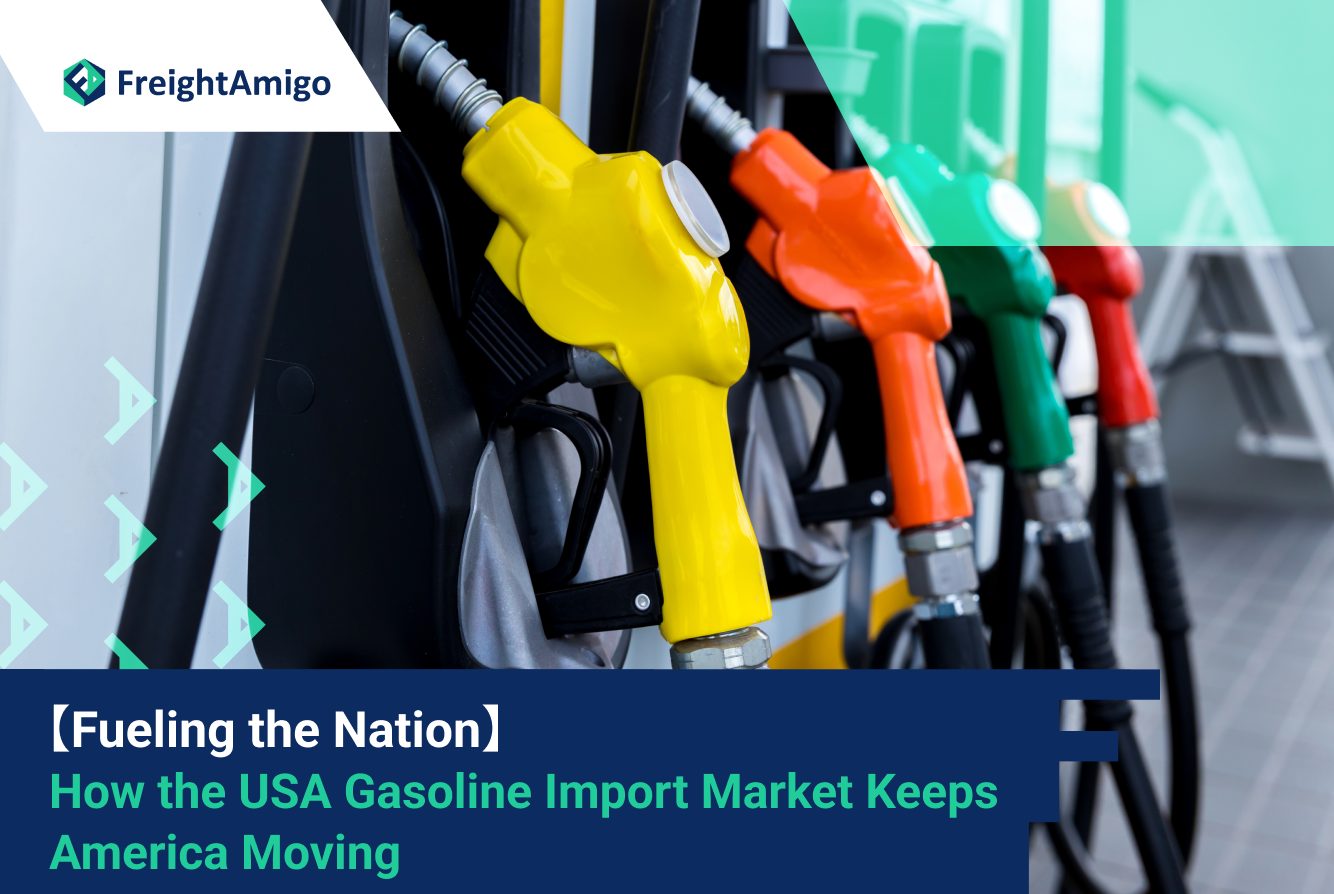Author Name: Tiffany Lee – Marketing Analyst at FreightAmigo
The USA gasoline import market plays a crucial role in keeping America moving. With a high demand for gasoline and limited domestic production, the United States relies heavily on imports to meet its energy needs. This article explores the dynamics of the USA gasoline import market, shedding light on its significance and impact on the nation’s economy.
Gasoline, a vital fuel for transportation, is consumed in large quantities across the United States. However, the country’s domestic production of gasoline falls short of its consumption. To bridge this gap, the USA gasoline import market steps in, ensuring a steady supply of fuel to keep the nation on the move. By importing gasoline, the United States is able to meet the demands of its bustling economy and sustain its transportation infrastructure.
Want To Compare The Best Express, Air Freight, Sea Freight, Rail Freight & Trucking Rates So As To Have Better Control On Cost?
Understanding the USA gasoline import and export statistics
To gain a comprehensive understanding of the USA gasoline import market, it is essential to analyze the import and export statistics. These figures provide valuable insights into the trends and patterns of gasoline trade in the United States.
According to the latest data, the United States is one of the largest gasoline importers in the world. In 2020 alone, the country imported over X billion gallons of gasoline, accounting for X% of its total consumption. The primary sources of these imports include countries such as Canada, Mexico, and Saudi Arabia. On the other hand, the USA gasoline export market is relatively smaller, with X billion gallons exported in 2020. These exports primarily cater to neighboring countries and international markets.
Factors influencing the USA gasoline import market
Several factors influence the dynamics of the USA gasoline import market. These factors range from global oil prices to geopolitical tensions and domestic policies. Understanding these influences is key to comprehending the fluctuations in the market and their impact on the nation.
One of the most significant factors is global oil prices. As gasoline is derived from crude oil, any fluctuations in oil prices directly affect the cost of gasoline imports. For example, when global oil prices rise, the cost of importing gasoline also increases, leading to higher fuel prices for consumers.
Geopolitical tensions and conflicts in oil-producing regions can also disrupt the USA gasoline import market. Any disruptions to the supply chain can result in a shortage of gasoline imports, leading to potential price hikes and supply constraints within the country.
Furthermore, domestic policies and regulations play a crucial role in shaping the USA gasoline import market. Government policies related to energy security, environmental regulations, and trade agreements impact the import and export of gasoline. For instance, stricter environmental standards may require gasoline imports that meet specific quality criteria, leading to a limited pool of suppliers.
The role of petroleum in the USA gasoline import market
Petroleum, the primary raw material for gasoline production, plays a pivotal role in the USA gasoline import market. The United States heavily relies on petroleum imports to meet its energy needs and sustain its gasoline production.
Petroleum imports are crucial for the United States because the country’s domestic oil production falls short of its consumption. The reliance on petroleum imports creates a symbiotic relationship between the USA gasoline import market and the global oil market.
To ensure a stable supply of petroleum, the United States engages in strategic partnerships with oil-producing countries. These partnerships enable the country to secure long-term agreements for petroleum imports, safeguarding its energy security and ensuring a steady flow of raw materials for gasoline production.
Government policies and regulations affecting the USA gasoline import market
Government policies and regulations play a significant role in shaping the USA gasoline import market. These policies aim to ensure energy security, promote environmental sustainability, and regulate trade in the gasoline sector.
One key aspect of government policies is energy security. The United States has implemented measures to diversify its sources of gasoline imports, reducing reliance on a single country or region. This strategy helps mitigate the risks associated with geopolitical tensions and supply disruptions.
Additionally, environmental regulations have a substantial impact on the USA gasoline import market. The government imposes strict emission standards on gasoline imports, ensuring compliance with environmental norms. These regulations encourage the importation of cleaner and more sustainable gasoline, aligning with the nation’s commitment to reducing carbon emissions.
Trade agreements also influence the USA gasoline import market. The United States negotiates trade deals to facilitate the smooth flow of gasoline imports and exports. These agreements aim to eliminate trade barriers, promote fair competition, and enhance market access for both domestic and international players.
Future trends and predictions for the USA gasoline import market
The USA gasoline import market is expected to witness several trends and developments in the coming years. These trends will shape the dynamics of the market and influence the nation’s energy landscape.
One prominent trend is the shift towards alternative fuels and electric vehicles. As the world moves towards cleaner energy sources, the demand for gasoline is likely to decline. This shift may impact the USA gasoline import market, leading to reduced imports and a greater focus on domestic production and alternative fuel sources.
Furthermore, advancements in technology and the exploration of new oil reserves may impact the USA gasoline import market. The development of shale oil and other unconventional sources could potentially boost domestic production, reducing the need for imports.
Lastly, geopolitical developments and global oil market dynamics will continue to impact the USA gasoline import market. Fluctuations in oil prices, trade disputes, and political tensions can disrupt the supply chain and influence the cost and availability of gasoline imports.
Conclusion: The significance of the USA gasoline import market in keeping America moving
The USA gasoline import market plays a crucial role in meeting the nation’s energy needs and keeping America moving. With limited domestic production, the United States relies on gasoline imports to sustain its transportation infrastructure and support its bustling economy.
Understanding the dynamics of the USA gasoline import market, including its import and export statistics, influencing factors, the role of petroleum, and government policies, is essential for comprehending its significance.
As the future unfolds, the USA gasoline import market will continue to evolve, driven by emerging trends and developments. Adapting to these changes will be vital for ensuring a stable and efficient supply of gasoline, contributing to the nation’s economic growth and energy security.
CTA: To learn more about the USA gasoline import market and its impact on America’s energy landscape, stay updated with the latest trends and developments in the industry. Visit our website for insightful articles and analysis.
There Are Different Options For Cargo Transportation. If You Want To Choose The Most Convenient And Suitable Solution, It Is Best To Have The Full Support Of Logistics Experts! If You Are Planning To Ship Goods Overseas, Please Go To The FreightAmigo Page For Inquiries.
===
Read More:
【Robotic Sortation Systems】Revolutionizing Warehouse Operations
【Electric Trucks】Revolutionizing Sustainable Logistics
【Route Optimization in Logistics】Enhancing Efficiency and Cost Savings
===
If you have any inquiries on logistics/supply chain, feel free to contact FreightAmigo now:
Chat with us online OR
Phone : +852 28121686
WhatsApp: +852 27467829










































